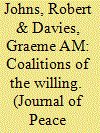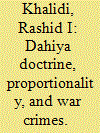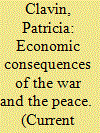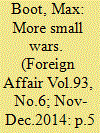|
|
|
Sort Order |
|
|
|
Items / Page
|
|
|
|
|
|
|
| Srl | Item |
| 1 |
ID:
135895


|
|
|
|
|
| Summary/Abstract |
Leaders remain subject to the same biological determinants and pressures that affect other humans. Yet, they also differ in their ability to regulate and marshal their emotions just as they diverge in their other skills, talents, limitations, and abilities. In particular, some are better at channeling their emotions to help shape foreign policy more efficiently than others. One of the most potent and powerful emotions with which leaders have to contend, particularly under conditions of provocation, is anger. Anger can influence judgment and decision making in systematic and predictable ways. Individual heritable differences can influence the conditions under which anger leads to aggressive action. Such differences can influence not only the environments into which leaders select, but also the ways they process and interpret information; these determinations can decisively influence the outcome of significant public policies, including decisions on conflict and war. As a result, emotion regulation can play a strategic role in leadership. Examples from several recent presidencies illustrate how such individual differences play out on the world stage.
|
|
|
|
|
|
|
|
|
|
|
|
|
|
|
|
| 2 |
ID:
134940


|
|
|
|
|
| Summary/Abstract |
This article reflects on the importance of linking micro and macro levels of analysis in order to advance our current understanding of civil wars and political violence processes and discusses the contributions of the articles in this special issue. We first identify the main problems in research on political violence that is focused on a single level of analysis and describe the challenges faced by research that attempts to establish connections between different levels. We then introduce the different articles in the special issue, with an emphasis on the micro–macro-level linkages they develop and highlighting their commonalities. We conclude by emphasizing the importance of a new research agenda for the study of civil wars and political violence that bridges social, economic, and political dynamics occurring at the local level and conflict processes taking place in the macro arena.
|
|
|
|
|
|
|
|
|
|
|
|
|
|
|
|
| 3 |
ID:
135896


|
|
|
|
|
| Summary/Abstract |
In the US context, scholars have demonstrated that public support for military intervention is influenced by the elite debate as presented in the national news media and that the volume of elite criticism reported is largely determined by opposition in Congress. Because the media “index” the debate among officials in Washington, a lively and comprehensive airing of the pros and cons of a military intervention often depends upon Congressional leaders taking an oppositional stance. But sometimes, American reporters will incorporate a surge of foreign leaders' critical views, even when Congressional leaders support administration policy or when they choose to remain silent due to strategic considerations. The question addressed by this article is whether such departures from traditional indexing behavior—which bring foreign views into media coverage in a significant manner—can be predicted based on the circumstances and journalists' incentives. The article also explores whether high-visibility opposition by credible foreign leaders, in particular United Nations officials and European allies, can substitute for partisan cues from domestic leaders and invigorate a national debate in a manner that influences public opinion.
|
|
|
|
|
|
|
|
|
|
|
|
|
|
|
|
| 4 |
ID:
137400


|
|
|
|
|
| Summary/Abstract |
A basic trade-off in military cooperation exists: States must respond to the dominant ally’s demands and act as a reliable partner while simultaneously making a decision that is acceptable to domestic audiences. We argue that compensatory burden-sharing strategies are imperfect but dependable solutions to manage foreign policy decisions at the domestic and alliance levels. Our theoretical expectations are tested using the US-Japan and US-Republic of Korea alliances and, in particular, the contribution of each country to the war in Afghanistan. We find that foreign aid commitments to third parties are made as a form of compensation when alliance expectations are substantial, but the secondary ally's ability to contribute militarily is highly constrained. Foreign aid has therefore served as an alliance management tool.
|
|
|
|
|
|
|
|
|
|
|
|
|
|
|
|
| 5 |
ID:
134455


|
|
|
|
|
| Summary/Abstract |
Studies of public support for war highlight the importance of context. Most people do not simply support or oppose the use of force but instead assess its merits depending on various aspects of the situation. One such aspect is the extent of international backing – whether from individual states or supranational organizations – for military action. This backing may be active, notably through the contribution of troops, or more a passive matter of endorsement or authorization of action. In this article, a survey experiment embedded in a major internet survey of British foreign policy attitudes (N = 2,205) is used to explore how international backing affects public support for military action. Britain’s military potential and recent history make it an obvious case study here. Both active and endorsement backing prove to have separate and significant positive effects on support. Importantly, the absolute number of troops involved matters far less than the proportion of total troop numbers to be contributed. And the perceived strength of the enemy predicts support only when the British are to contribute a large proportion of total forces. Predispositional variables are used to investigate the sources of the experimental effects but with little success: the impact of international backing proves remarkably consistent across the sample.
|
|
|
|
|
|
|
|
|
|
|
|
|
|
|
|
| 6 |
ID:
135818


|
|
|
|
|
| Summary/Abstract |
On War’s unfinished state has been a source of difficulties for interpretation for 180 years. By establishing a hierarchy of revision among the parts, we propose a criterion that can bring any part of On War in line with the most advanced stage of Clausewitz’s thinking. We exemplify the utility, illustrate the underpinnings and appreciate the potential of this criterion. We argue that the criterion offers the prospect of a shared, coherent, fully consistent and faithful rendering of Clausewitz’s theory of war.
|
|
|
|
|
|
|
|
|
|
|
|
|
|
|
|
| 7 |
ID:
136591


|
|
|
|
|
| Summary/Abstract |
IN JULY 2014, Israel launched its third and most massive military assault in a period of less than six years on the 1.8 million people of the Gaza Strip. In so doing, it killed over twenty-one hundred Palestinians and wounded more than eleven thousand. The vast majority of the thirteen thousand casualties were civilians, and well over half of them were women, children, old people, and the disabled. This latest massacre of the innocents provides the occasion for the Journal of Palestine Studies (JPS) to offer a special dossier centered on Gaza.
|
|
|
|
|
|
|
|
|
|
|
|
|
|
|
|
| 8 |
ID:
135238


|
|
|
|
|
| Summary/Abstract |
The modern, globalized economy had emerged with vigor and reach in the nineteenth century, but was no more a guarantor of domestic or world peace after 1918 than it had been in 1914
|
|
|
|
|
|
|
|
|
|
|
|
|
|
|
|
| 9 |
ID:
134674


|
|
|
|
|
| Summary/Abstract |
Grand or national strategy has emerged as a critical issue in security studies. Adam Garfinkle recently opined that American grand strategy has died a silent death. Too much attention has been devoted to definitions, or debates over the utility of strategy. Not enough consideration has been given to the complexities of actually building a robust strategy amidst that effectively integrates all elements of national power within a complex bureaucracy. Oddly, the exclusion of politics contradicts our understanding of war and conflict. Likewise, not enough attention has been applied to the fundamental components of building a competitive strategy that can be sustained over time. This essay offers an introductory discussion of the basic considerations or components of national strategy.
|
|
|
|
|
|
|
|
|
|
|
|
|
|
|
|
| 10 |
ID:
135190


|
|
|
|
|
| Summary/Abstract |
After 13 years of war, the loss of many thousands of lives, and the expenditure of trillions of dollars, what has the United States learned? The answer depends on not only who is asking but when. The story of the Iraq war would have different endings, and morals, if told in 2003, 2006, 2011, or 2014, and it will continue to evolve. As for Afghanistan, the narrative there has also shifted over time, and the ending also remains in doubt. Neither disaster has been unmitigated. But few would argue that Washington’s approach to either has been a success worth emulating. So the most important question today is what can be learned from the failures.
|
|
|
|
|
|
|
|
|
|
|
|
|
|
|
|
| 11 |
ID:
134723


|
|
|
|
|
| Summary/Abstract |
In a previous issue of this journal, Adam Goodwin (2010) argued that applications of ‘orthodox’ evolutionary theory in international relations are reductionist, necessarily privilege an individualist ontology, and doom social theorising to the false assumption that humans are by nature selfish and competitive. As an alternative, Goodwin presents Kropotkin’s Mutual Aid framework both for overcoming the reductionism of ‘orthodox’ evolutionary theory and for establishing a holist ontology cantered around the autonomy of social forms. I argue that Goodwin’s representation of ‘orthodox’ evolutionary theory is in fact far from orthodoxy and instead rests on misunderstandings both of how natural selection operates and what it operates to produce – adaptations. I show that modern evolutionary theory rests on neither individualist nor holist ontologies, and instead demonstrates that humans are by nature neither hawkish nor dovish. I provide examples on the evolution of cooperation and war to demonstrate that modern evolutionary theory can explain a range of pro- and anti-social behaviours and that fears of biological reductionism in international relations are misplaced.
|
|
|
|
|
|
|
|
|
|
|
|
|
|
|
|
| 12 |
ID:
135371


|
|
|
|
|
| Summary/Abstract |
In May 2009, Lieutenant Mark Evison, of the 1st Battalion Welsh Guards, was shot in the shoulder during an ambush on his platoon while on patrol in the Nad-e Ali district of Helmand Province, Afghanistan. Three days later, having first been flown to Camp Bastion for emergency surgery and then to the UK for further treatment, he was declared brain dead and his family switched off his life-support machines. In this article, Lieutenant Evison's mother provides a very personal reflection on the extremely difficult period following his death, recalling her impressions of the support provided to the platoon members, and the legal process that followed in the form of the coroner's inquest.
|
|
|
|
|
|
|
|
|
|
|
|
|
|
|
|
| 13 |
ID:
136126


|
|
|
|
|
| Summary/Abstract |
The Ukrainian crisis in a way resembles wars of late feudalism in Europe, with private armies formed of assorted mercenaries and retired military of most diverse ethnic, ideological and social affiliations.
|
|
|
|
|
|
|
|
|
|
|
|
|
|
|
|
| 14 |
ID:
135893


|
|
|
|
|
| Summary/Abstract |
This article is a critique of two reports of parliamentary inquiries, into intervention and soft power, respectively. Neither report includes any discussion of Britain's involvement in and culpability for the wars in Iraq and Afghanistan. Despite a more radical approach taken by the report on soft power, the article argues that the failure to address recent wars is symptomatic of a deeper and more dangerous inability to face up to profound and dangerous changes taking place in the world.
|
|
|
|
|
|
|
|
|
|
|
|
|
|
|
|
| 15 |
ID:
135191


|
|
|
|
|
| Summary/Abstract |
Although the wars in Afghanistan and Iraq are far from the costliest the United States has ever fought in terms of either blood or treasure, they have exacted a much greater toll than the relatively bloodless wars Americans had gotten used to fighting in the 1990s. As of this writing, 2,344 U.S. troops have been killed in Afghanistan and 4,486 in Iraq, and tens of thousands more have been injured. The financial costs reach into the trillions of dollars.
|
|
|
|
|
|
|
|
|
|
|
|
|
|
|
|
| 16 |
ID:
135333


|
|
|
|
|
| Summary/Abstract |
Since September 11, 2001, Pakistan has pursued seemingly incongruous courses of action in Afghanistan. It has participated in the U.S. and international intervention in Afghanistan at the same time as it has permitted much of the Afghan Taliban's political leadership and many of its military commanders to visit or reside in Pakistani urban centers. This incongruence is all the more puzzling in light of the expansion of indiscriminate and costly violence directed against Islamabad by Pakistani groups affiliated with the Afghan Taliban. Pakistan's policy is the result not only of its enduring rivalry with India but also of historically rooted domestic imbalances and antagonistic relations with successive governments in Afghanistan. Three critical features of the Pakistani political system—the militarized nature of foreign policy making, ties between military institutions and Islamist networks, and the more recent rise of grassroots violence—have contributed to Pakistan's accommodation of the Afghan Taliban. Additionally, mutual suspicion surrounding the contentious Afghanistan-Pakistan border and Islamabad's long record of interference in Afghan politics have continued to divide Kabul and Islamabad, diminishing the prospect of cooperation between the two capitals. These determinants of Pakistan's foreign policy behavior reveal the prospects of and obstacles to resolving the numerous issues of contention that characterize the Afghanistan-Pakistan relationship today.
|
|
|
|
|
|
|
|
|
|
|
|
|
|
|
|
| 17 |
ID:
134250


|
|
|
|
|
| Summary/Abstract |
This article analyses the evolving uses of social media during wartime through the IDF (Israel Defense Forces) Spokesperson Facebook and Twitter accounts. The conflict between Israel and Hamas-affiliated groups in November 2012 has generated interesting data about social media use by a sovereign power in wartime and the resultant networked discourse. Facebook data is examined for effective patterns of dissemination through both content analysis and discourse analysis. Twitter data is explored through connected concept analysis to map the construction of meaning in social media texts shared by the IDF. The systematic examination of this social media data allows the authors’ analysis to comment on the evolving modes, methods and expectations for state public diplomacy, propaganda and transparency during wartime.
|
|
|
|
|
|
|
|
|
|
|
|
|
|
|
|
| 18 |
ID:
135897


|
|
|
|
|
| Summary/Abstract |
Much research disputes the president's ability to lead public opinion and shows media to have influenced public opinion concerning the war in Iraq. We argue that although news tone is likely to have affected public support for the war, presidential rhetoric could be influential for two reasons. First, heightened presidential attention to the war increases the public's accessibility to the president's perspective on the war. Second, a survey question that cues the respondent to consider the president explicitly in their evaluation of the Iraq war is likely to encourage responsiveness to presidential rhetoric. To assess these arguments, we simultaneously examine the impact that presidential tone and media tone have on public support for the war in Iraq by analyzing an original dataset of presidential speeches, news coverage, and public support for the war and the president's handling of it from 2002 to 2008. Our findings reveal that although media tone drives public support for the war in Iraq, presidential tone influences the public's view of President Bush's handling of it.
|
|
|
|
|
|
|
|
|
|
|
|
|
|
|
|
| 19 |
ID:
134732


|
|
|
|
|
| Summary/Abstract |
This article deals with the definition of the religion sector of securitisation theory, and seeks to strengthen the contribution of securitisation theory to the study of religious violence and doctrinal conflicts. It is argued that the original elaboration of the security sector leans too heavily on a West-centric notion of religion as apolitical and of faith as a distinction between the sacred and the profane. These leanings limit the theory’s global applicability, consequently leading to a challengeable formula for the desecuritisation of conflicts with religious dimensions. Two alternative ways of integrating religion within a securitisation framework are suggested, one of which is based on a multidimensional concept of religion that embraces the different dimensions of religion defended by religio-political actors around the world. The second way focuses on doctrines in order to embrace equally the securitisation of doctrines conventionally designated as secular. It is also maintained that convincing reasons exist for treating religion/doctrine as a separate sector, despite the fact that religion appears to have cross-sectoral relevance. A religion/doctrine sector has strong defining characteristics that, in addition to the referent object(s), also include the criteria for survival and successful securitisation, the narrative structure of religious/doctrinal securitisations and the proclivity of religion/doctrine towards macrosecuritisation.
|
|
|
|
|
|
|
|
|
|
|
|
|
|
|
|
| 20 |
ID:
135288


|
|
|
|
|
| Summary/Abstract |
This article seeks to add to the exploration and development of Imperial History's contribution to the discipline of International Relations (IR). Focusing on British perceptions of Afghanistan in the period preceding the first Anglo-Afghan war the article considers colonial knowledge as a source of identity construction, but in a manner that avoids deploying anachronistic concepts, in this case that of the Afghan ‘state’. This approach, which draws on the insights brought to IR by historical sociology, shows that engaging with Imperial History within IR can encourage a more reflexive attitude to core disciplinary categories. This not only reveals alternative approaches to the construction of specific political communities but it also allows for a more historicist mode in the use of history by IR as a discipline. Furthermore, by moving away from material based purely on diplomatic history, Afghanistan's imperial encounter can be recovered from the dominance of ‘Great Game’ narratives, offering an account that is more appreciative of the Afghanistan context.
|
|
|
|
|
|
|
|
|
|
|
|
|
|
|
|
|
|
|
|
|